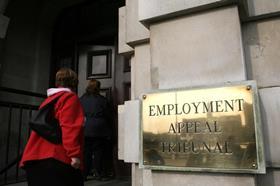An employment judge was right not to recuse herself from a tribunal over work she had done as a solicitor many years earlier, the Employment Appeal Tribunal has found.

Employment judge Moore had acted as a solicitor in union-backed multiple equal pay claims against local authorities over 10 years ago. She refused to recuse herself as the employment judge from a case management hearing in an equal pay claim.
The judge told the parties at the recusal hearing that she had not been ‘directly involved in earlier litigation’ against a council ‘other than in a supervisory capacity’ and had ‘not directly represented’ any of the claimants in the earlier proceedings.
Swansea City & County Council appealed against the employment judge’s decision, arguing she had erred in law.
The tribunal claim against the local authority centres on some 1,000 council employees who claim the council breached the equal pay and indirect discrimination provisions of the Equality Act 2010.
in Swansea City & County Council v D Abraham & Ors, Lord Fairley, president of the Employment Appeal Tribunal, said there was nothing to suggest the judge had not carried out a ‘close examination’ of the factors relied upon by the council which sought recusal. He added that the ‘suggested areas of possible factual overlap between the two sets of proceedings were speculative and identified by the [council] only in the most general of terms’.
Dismissing the appeal, he added: ‘The appellant’s oft-repeated assertions that there were overlaps of claimants and respondents, that the legal representatives were the same and that some of the roles in the two sets of cases were either the same or similar do not explain why those factors, alone or in combination, might be said to give rise to a real possibility of apparent bias.
Read more
‘The fair-minded and informed observer would have recognised that any agent/client relationship between the judge and a union client represented by her former employer firm had ended more than a decade previously. They would have seen no real possibility of bias arising from the mere fact of a prior professional relationship between a lawyer and a client which had ended more than a decade before.'
‘They would have recognised that mere knowledge of the law and the practice of equal pay litigation does not, of itself, give rise to any real possibility of bias. They would have noted that…case management is a very different exercise to that of hearing evidence, making findings of fact and issuing a judgment.
‘Critically, they would also have noted that the party applying for recusal had not identified any specific area of actual or potential factual overlap of which residual knowledge would (or even might) consciously or unconsciously influence case management decisions.’
It was not an error of law for the employment judge not to recuse herself at the case management hearing, but the judge acknowledged that ‘the same conclusion does not necessarily apply to the whole future involvement’ of Moore in the current proceedings. There would ‘inevitably’ be a need for ‘ongoing vigilance’.


























